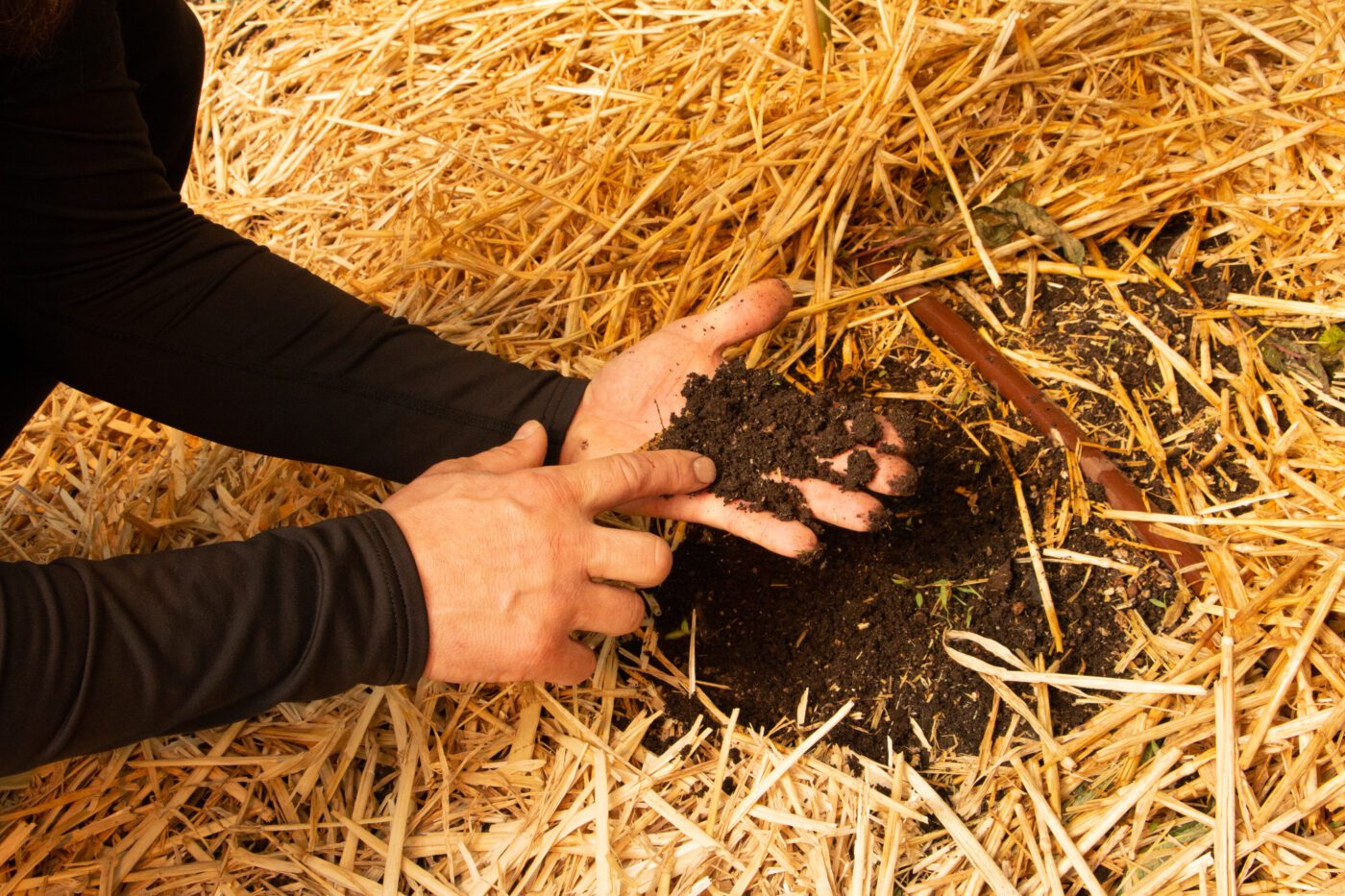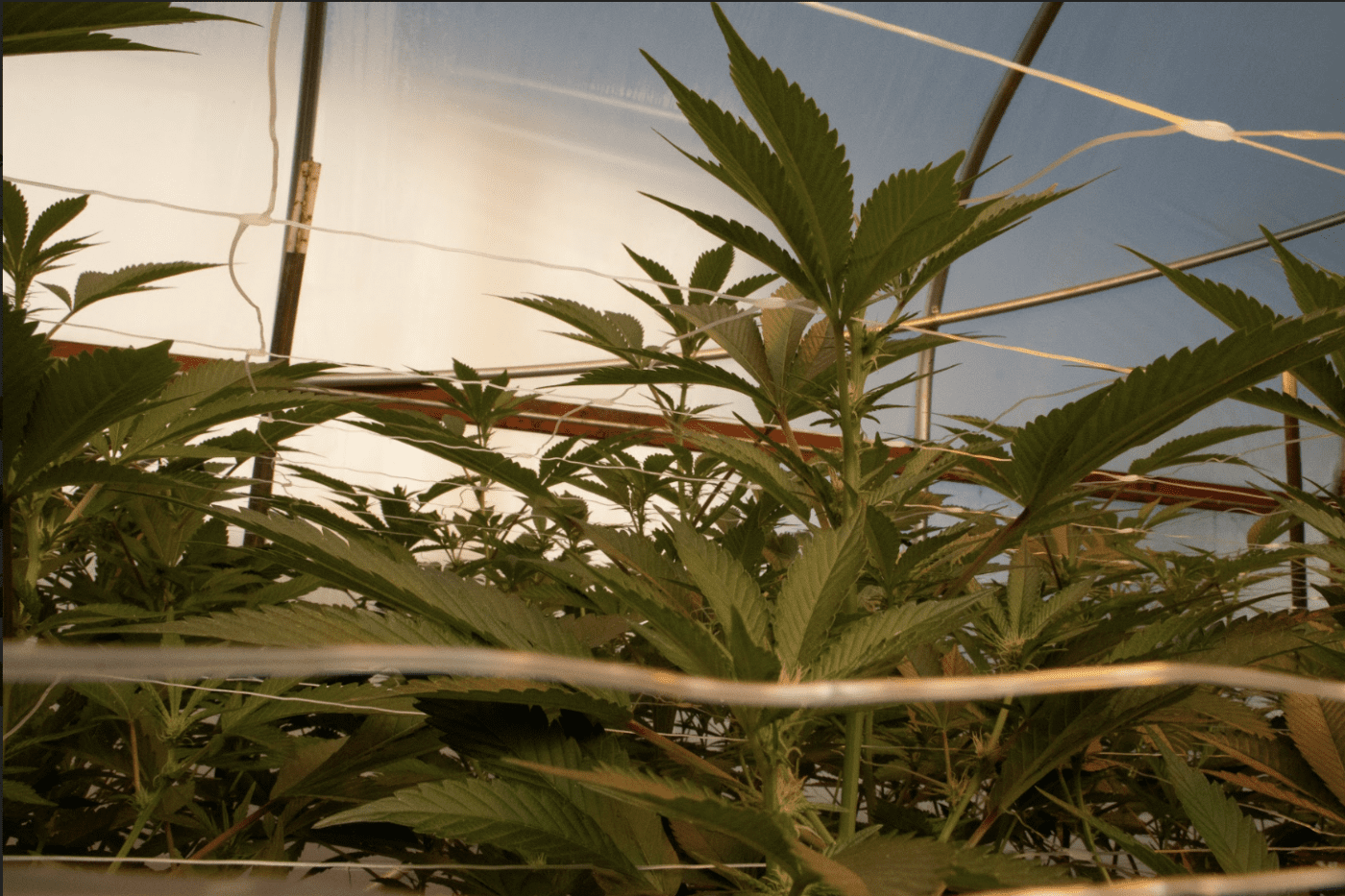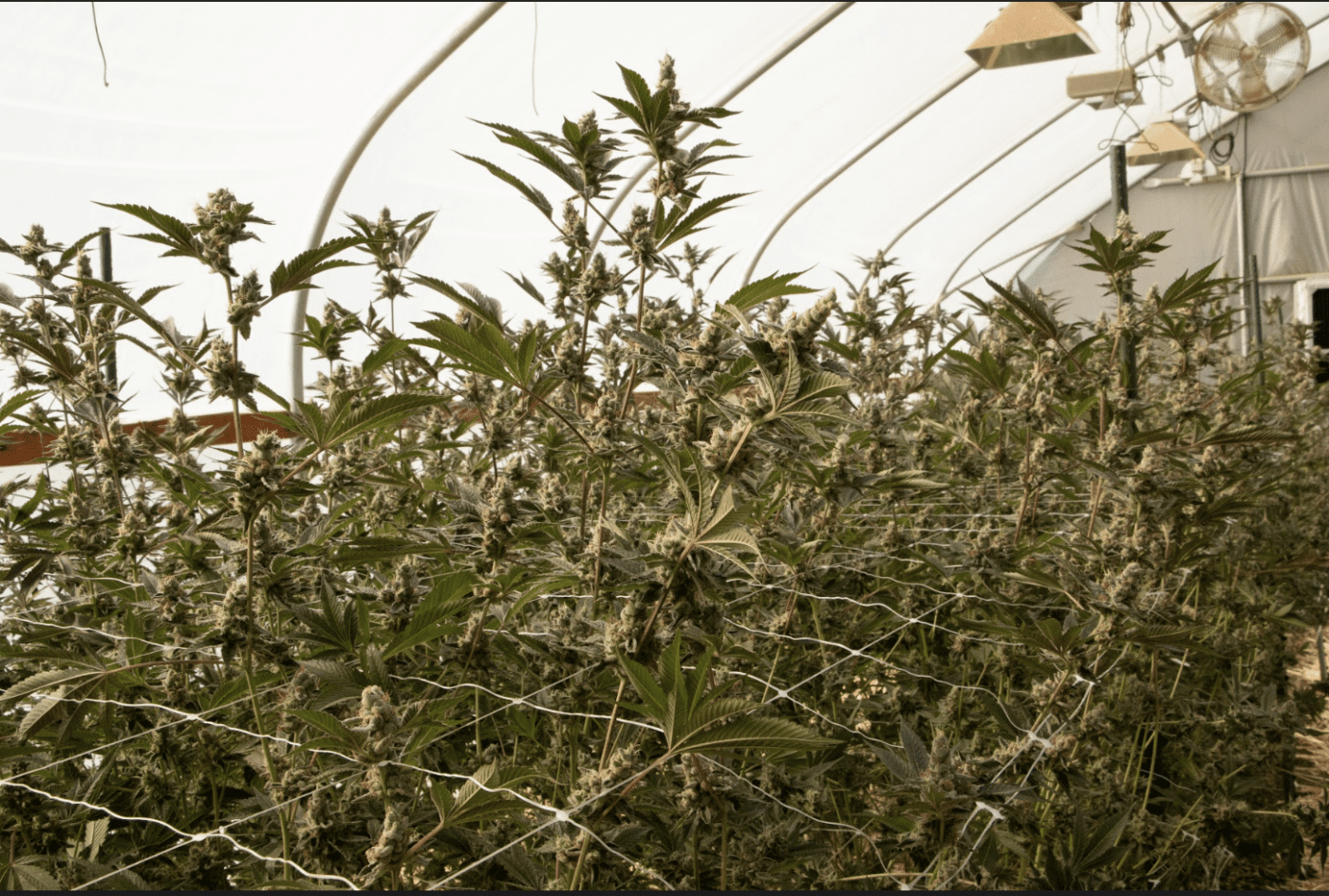In the area around Eugene, Oregon, it doesn’t take driving for too many miles before you’re out of the city and into farmland. Head north from Eugene toward the town of Harrisburg, not quite 20 miles, and the area is scenic, but flat. It’s historically been orchard, crop, and ranchland. To get to Real Eve, you pass a couple of Century Farms (farms with 100+ years of connection to the same family). The soil here is naturally good for farming.
Real Eve has carved out their five acres with 1/4 acre under cultivation. They heat up their greenhouses with a 1,000-gallon propane tank so it’s never under 70 degrees. They grow moms for clones in small rooms in soil that is never tilled. They build the soil with dry amendments and compost teas to feed it. At harvest, they take soil plugs to a soil lab for testing, to learn what the plants are missing. “We start off with a good living native soil base and top it off with compost other things to keep the soil alive,” says Ryley McCorquodale, one of the farm’s owners who has been there since Day 1.
The farm is small but focused on quality. The first grow room is 80 degrees and 80% humidity, a toasty warm place to be on a cold Oregon day in February when it is just above freezing outside. Here, they’re growing a GMO x Root Beer. “This is an exciting new one for us,” says McCorquodale. “I just took a bunch of clones off of it so it’s not real beautiful right now but they’re doing what they’re supposed to do. They give us fresh, healthy batch of clones every time.”
Another one in the room is GAK Melon, which will be used for making bubble hash and rosin. “You’ll never see this one as flower on a shelf,” says McCorquodale. “This one is from Dying Breed Seeds and is pretty unique to our farm. I think we may be the only ones or maybe one or two others in Oregon who have this.”
The other owner, Abe Kohler, arrives to walk through the rest of the grow rooms with us. In the second grow room are GAK Melon veg transplants starts about a week from being ready along with others that are about 8 weeks old, 6 weeks out of the clone room. The seedlings are for pheno hunting. They’re growing up to 20 of each seedling to see the different expressions they’ll get.

“On our next round, these will go into the greenhouse,” McCorquodale says. “I whittled this down from 30 different ones to one keeper and this is our first chance to do a full batch of it. We’re excited for that.”
Another new one they’ll be putting on the market for the first time is Tropicana Cherries, a blend of Cherry Cookies x Tropicana Cookies bred by Relentless Genetics. “It’s a very beautiful plant, very purple,” says McCorquodale, “and we’ll be making hash out of this one too. It has a very unique flavor of oranges and cherries.
At first, Real Eve focused on flower production, but then also started looking at whole plants for hash production.”Normally for hash you’ll take all the best stuff, put that over to flower and all your moms do to hash but we’re looking for plants that’ll actually be good for hash and financially as well. These produce a yield on hash that’s almost the same as what we would get selling this as flower,” McCorquodale says. “There’s so much flower on the Oregon market that we had to diversify.”
The Oregon market (as many markets are) is tough for growers who test low, because it’s hard for the growers to find buyers in dispensaries. Along with flower, Real Eve also has a round of pre-rolls coming out, as soon as packaging gets settled.
Real Eve now has Georgia Pie on the market bred by Seed Junky Genetics, along with Devil Driver from Tiki Madman which was another new one. “These are in the second, almost third week,” says McCorquodale. “They really blow up from those little tiny plants once you get ’em into our soil. They love the soil.”

“We didn’t build up beds, we just grow in the soil that’s here and focus on keeping it living and healthy,” says McCorquodale. “There’s a layer of mycorrhiza going through our whole bed that’s just growing underneath the soil and it keeps a lot of things alive. It really helps plants flourish.”
They first discovered the mycorrhizal layer growing in a large chunk. And what I’ll do is I’ll take that and put it into holes and then it starts to spread and go through the whole bed. We add a layers of compost on top of the straw, the worms come up and eat that turn into new soil. These beds are four years old and we’ve never tilled or changed the soil.”
Another batch is Banana Crashers and Unicorn Poop, which was another pheno hunt with GMO in its genetics. “These are literally ready for harvest today,” McCorquodale says. “They’re very purple, very photogenic.”
McCorquodale offers a pluck of a tiny leaf off of Laffy Taffy. “Go ahead, roll it in your fingers and smell it,” he says. It really does smell just like the fruity candy. “There’s another real Laffy Taffy out there but I don’t know the genetics of this one, this was just a random bag seed from somebody in Eugene. I smoke this one. It smells great but it tests at 14% so the dispensaries won’t even look at it.”
The Unicorn Poop is another one that’s ready for harvest. The GMO won’t be ready for another week or so. “You could harvest it now, you just won’t get all the flavors out of it,” McCorquodale says. “It’s like fruit, you’ve really got to let the plants ripen. Like any fruit or anything, you pick it early and it’s going to look good but it won’t taste good.”
Abe and Ryley are 50-50 owners who started this business from the very beginning. “Almost 10 years,” says Kohler.
The pair started off processing oil when it was still medical. That’s how they built up their money so they could get the farm they’re standing on now. They originally were planning to focus on extracts, but the farm had a rough start. “Lots of changes in the industry and it was a lot of change for us learning how to grow like this,” says McCorquodale.
The photographer jokes and asks to get a photo of the two together and says “Act like you like each other.” The paid both start laughing and hugging each other. “We still do like each other!” says Kohler. “That’s rare in the industry, to still get along after 10, 12 years. We met each other in the tattoo industry and we were really into that for a while then 10 years ago got into weed.”
The farm has also grown with the addition of consultant and coordinator Jim Davis. The team is prepping a spot for some outdoor grows in the future. On the ground, you can see huge radishes the size of grapefruits that haven’t been harvested in two years. “It breaks up the soil and adds nutrients,” says Kohler. “We just mow ’em down.”

Kohler takes a moment to gaze out west toward the mountains. “Those mountains there give a different show every day between the light and the clouds,” he says. “It’s so nice to watch. Amazing sunsets and amazing clouds.”
After a brief walk outside to appreciate the environment and the creek that runs along one edge of the property, Abe and Ryley head into their drying and storage area. They’re getting ready for their packaging of the pre-rolls, with boxes of boxes and stickers to go on the boxes.
Even though the walk through the farm doesn’t take very long — “At any given time we only have 20 pounds!” says Davis — it’s easy to see how much the team here cares about their work. “We’re definitely one of the smaller operations,” says Ryley. “Even the other greenhouse farms are a bit bigger than us, but we put all we had into it and are working towards upgrading. It’s always hard to secure a loan when all your money is from cannabis! But hopefully we’ll soon have a full working farm out here.”
“I’m really happy that I finally found this place,” says consultant and coordinator Jim Davis. “It’s just a special place. Yes it’s small, but we all share the same passion.”
Davis is an artist by trade who used to airbrush Harleys and hot rods. He learned metal work so he could have more flat surfaces to paint on. “I learned this whole other trade just so I could get better at what I was already doing,” explains Davis.
Davis and Ryley met at a festival and once they started talking, they were side by side the whole rest of the day. “After talking to him, I realized, oh, they’re extractors who are learning how to grow, so they can get better material to put in the machine. So it’s kind of the same idea. We all went after different passions so we could get better at our other passions. In this work, you have to have a curiosity and a desire to get better or else you’re just not going to want to do any of it.”
Davis says he never imagined in his former work life that he would be talking with Oregon Liquor Control agents about whether the packaging for a product called Unicorn Poop was too attractive to kids or not. “You have to learn about the whole business end of this even if that’s not what you want to do,” says Davis. “We have to learn about all these other things and we wouldn’t be sitting here if I didn’t love it, you know?”

